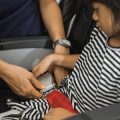1. Why Hydration Matters for Toddlers
Keeping your toddler hydrated is essential for their overall health and development. Water plays a crucial role in various bodily functions, including digestion, temperature regulation, and nutrient absorption. Since toddlers are constantly growing and active, they need enough fluids to stay energized and healthy.
The Role of Water in a Toddlers Body
Water helps with several key functions in your toddler’s body, such as:
- Digestion: Water aids in breaking down food and absorbing nutrients efficiently.
- Temperature Regulation: Toddlers can overheat quickly, especially when playing outside. Proper hydration helps regulate their body temperature.
- Joint and Muscle Health: Staying hydrated keeps their joints and muscles working properly, which is important as they learn to walk, run, and play.
- Brain Function: Dehydration can lead to fatigue and difficulty concentrating, even in young children.
How Much Water Does a Toddler Need?
The amount of water a toddler needs depends on their age, activity level, and the weather. Here’s a general guideline:
| Age | Recommended Daily Water Intake |
|---|---|
| 1-3 years old | About 4 cups (32 oz) of total fluids (including milk and water) |
| 4-5 years old | About 5 cups (40 oz) of total fluids |
Signs That Your Toddler Needs More Fluids
Toddlers may not always recognize when they’re thirsty, so it’s important to watch for signs of dehydration, such as:
- Dark yellow urine or fewer wet diapers
- Dry lips and mouth
- Lack of energy or unusual tiredness
- Irritability or fussiness
- Dizziness or lightheadedness
Encouraging Your Toddler to Drink More Water
If your toddler isn’t drinking enough water, try these tips:
- Make it fun: Use colorful cups or straws to make drinking water more exciting.
- Add natural flavors: Infuse water with fresh fruit like strawberries or cucumbers.
- Offer water regularly: Instead of waiting until they’re thirsty, offer small sips throughout the day.
- Be a role model: Kids mimic what they see—drink plenty of water yourself!
Ensuring that your toddler stays properly hydrated is one of the easiest ways to support their health and well-being. By making hydration a daily habit, you can help them grow strong, stay active, and feel their best.
2. Common Signs of Dehydration in Toddlers
Keeping your toddler properly hydrated is crucial for their overall health. However, it can sometimes be tricky to tell if they’re getting enough fluids. Since toddlers cant always express when theyre thirsty, its important to recognize the early signs of dehydration. Here are some common symptoms to watch for:
Key Symptoms of Dehydration
| Symptom | Description |
|---|---|
| Dry Mouth and Lips | If your toddler’s mouth or lips appear dry or cracked, it may be a sign they need more fluids. |
| Fewer Wet Diapers | A well-hydrated toddler should have several wet diapers a day. If you notice fewer wet diapers than usual, dehydration could be the cause. |
| Irritability and Fussiness | Lack of fluids can make toddlers cranky and more difficult to soothe. |
| Fatigue and Low Energy | If your toddler seems more tired than usual or less active, dehydration might be affecting their energy levels. |
| No Tears When Crying | If your child cries but produces little to no tears, this can indicate dehydration. |
| Darker Urine | Pale yellow urine is a good sign of hydration, while dark yellow or amber-colored urine suggests dehydration. |
When to Seek Medical Attention
Mild dehydration can often be managed at home by increasing fluid intake. However, if you notice severe symptoms like sunken eyes, extreme drowsiness, or rapid breathing, contact your pediatrician immediately.
![]()
3. Best Drinks to Keep Your Toddler Hydrated
Keeping your toddler hydrated is essential for their overall health and development. Choosing the right drinks ensures they get the fluids they need without unnecessary sugars or artificial ingredients. Here are some of the best hydration options for toddlers.
Water: The Best Choice
Water should always be the primary source of hydration for toddlers. It helps regulate body temperature, supports digestion, and keeps their energy levels stable throughout the day.
Milk: A Nutritious Option
Milk is another excellent choice for hydration, providing essential nutrients like calcium, vitamin D, and protein. Whole milk is recommended for children under two years old, while older toddlers can transition to low-fat or non-fat milk.
Natural Fruit-Infused Water
If your toddler finds plain water boring, try adding natural flavors by infusing it with fresh fruits. This keeps them interested in drinking more water without added sugars or artificial flavors.
Simple Fruit-Infused Water Ideas:
| Fruit Combination | Flavor Profile |
|---|---|
| Strawberry & Lemon | Refreshing and slightly tangy |
| Orange & Mint | Citrusy with a hint of freshness |
| Cucumber & Watermelon | Mildly sweet and hydrating |
Diluted Natural Fruit Juice
While fruit juice contains vitamins, it also has natural sugars that can contribute to cavities. If offering juice, dilute it with water (one part juice to three parts water) and limit intake to no more than 4 ounces per day.
Avoid Sugary and Artificial Drinks
Steer clear of sugary drinks like soda, sports drinks, and flavored juices with added sweeteners. These beverages can lead to unhealthy weight gain and dental issues.
By choosing safe and healthy drink options, you can ensure your toddler stays hydrated while developing good drinking habits for life.
4. Drinks to Avoid for Toddlers
While keeping your toddler hydrated is important, not all drinks are suitable for their growing bodies. Some beverages can be harmful due to high sugar content, caffeine, or artificial additives. Knowing which drinks to avoid can help you make healthier choices for your child.
Why Some Drinks Are Not Toddler-Friendly
Toddlers have developing digestive systems and metabolisms that are sensitive to certain ingredients. Drinks with excessive sugar, caffeine, or artificial flavors can contribute to poor health, including dental problems, sleep disturbances, and unnecessary calorie intake.
Common Drinks to Avoid
| Drink | Why Its Not Recommended |
|---|---|
| Sugary Juices | High in sugar, leading to cavities and unhealthy weight gain. |
| Soda | Contains caffeine and excessive sugar, which can affect sleep and digestion. |
| Sports & Energy Drinks | Often contain caffeine, artificial colors, and high sodium levels. |
| Caffeinated Beverages (Tea & Coffee) | Caffeine can interfere with sleep and cause restlessness in young children. |
| Flavored Milk | Additives and extra sugars make it less healthy than plain milk. |
Better Alternatives for Hydration
If your toddler enjoys sweet or flavored drinks, try offering diluted natural fruit juice (in moderation), infused water with fresh fruits, or unsweetened coconut water as a healthier option. Encouraging water as the main source of hydration from an early age helps build good drinking habits for the future.
5. Tips to Encourage Healthy Hydration Habits
Keeping your toddler hydrated doesn’t have to be a struggle! With a few creative strategies, you can make drinking water fun and ensure they’re getting enough fluids throughout the day. Here are some practical ways to encourage healthy hydration habits.
Make Drinking Water Fun
- Use Fun Cups and Straws: Let your toddler pick out their favorite cup or use colorful, silly straws to make drinking water exciting.
- Add a Splash of Flavor: Infuse water with natural flavors like sliced fruits (strawberries, oranges, or cucumbers) to make it more appealing.
- Create a Reward System: Use a sticker chart where your child earns a small reward for meeting their daily water goals.
Set a Hydration Routine
- Offer Water Regularly: Give your toddler small amounts of water throughout the day rather than waiting until they’re thirsty.
- Pair Water with Meals and Snacks: Encourage your child to drink water alongside their meals instead of sugary drinks.
- Lead by Example: When toddlers see parents and siblings drinking water often, they’re more likely to do the same.
Best Drinks for Toddlers
Apart from plain water, there are other healthy options to keep your toddler hydrated. Here’s a quick comparison of recommended drinks:
| Drink | Benefits |
|---|---|
| Water | The best choice for hydration with no added sugars or calories. |
| Diluted Fruit Juice | A small amount (4 oz per day) can provide vitamins but should be limited due to sugar content. |
| Milk | A good source of calcium and protein; best served during meals. |
| Coconut Water | Naturally hydrating with electrolytes but should be given in moderation due to natural sugars. |
Avoid Dehydration Triggers
- Limit Sugary Drinks: Avoid sodas, flavored milk, and sports drinks as they can lead to dehydration rather than hydration.
- Watch for Signs of Thirst: If your toddler is showing signs of dehydration like dry lips or dark urine, increase their fluid intake immediately.
- Keeps Drinks Accessible: Have a spill-proof cup within reach so your toddler can take sips whenever they feel thirsty.
Create Positive Associations with Water
- Name Their Water Bottle: Give their bottle a fun name or let them decorate it with stickers to create excitement around drinking water.
- Tie It to Storytime: Read books about healthy habits and staying hydrated while offering sips of water.
- Praise Hydration Efforts: Celebrate when they finish their water cup with positive reinforcement like clapping or high-fives.
By making hydration engaging and effortless, you can help your toddler develop lifelong healthy drinking habits!


